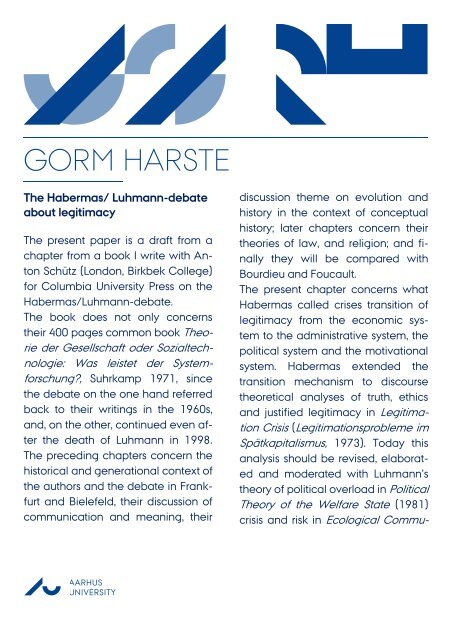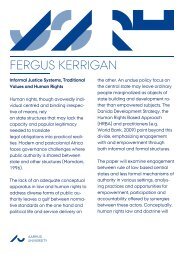GORM HARSTE
GORM HARSTE
GORM HARSTE
You also want an ePaper? Increase the reach of your titles
YUMPU automatically turns print PDFs into web optimized ePapers that Google loves.
US AARH<br />
<strong>GORM</strong> <strong>HARSTE</strong><br />
The Habermas/ Luhmann-debate<br />
about legitimacy<br />
The present paper is a draft from a<br />
chapter from a book I write with Anton<br />
Schütz (London, Birkbek College)<br />
for Columbia University Press on the<br />
Habermas/Luhmann-debate.<br />
The book does not only concerns<br />
their 400 pages common book Theorie<br />
der Gesellschaft oder Sozialtechnologie:<br />
Was leistet der Systemforschung,<br />
Suhrkamp 1971, since<br />
the debate on the one hand referred<br />
back to their writings in the 1960s,<br />
and, on the other, continued even after<br />
the death of Luhmann in 1998.<br />
The preceding chapters concern the<br />
historical and generational context of<br />
the authors and the debate in Frankfurt<br />
and Bielefeld, their discussion of<br />
communication and meaning, their<br />
discussion theme on evolution and<br />
history in the context of conceptual<br />
history; later chapters concern their<br />
theories of law, and religion; and finally<br />
they will be compared with<br />
Bourdieu and Foucault.<br />
The present chapter concerns what<br />
Habermas called crises transition of<br />
legitimacy from the economic system<br />
to the administrative system, the<br />
political system and the motivational<br />
system. Habermas extended the<br />
transition mechanism to discourse<br />
theoretical analyses of truth, ethics<br />
and justified legitimacy in Legitimation<br />
Crisis (Legitimationsprobleme im<br />
Spätkapitalismus, 1973). Today this<br />
analysis should be revised, elaborated<br />
and moderated with Luhmann’s<br />
theory of political overload in Political<br />
Theory of the Welfare State (1981)<br />
crisis and risk in Ecological Commu-<br />
AARHUS<br />
UNIVERSITY
nication (1986) and Risk Sociology<br />
(1991). There Luhmann describes a<br />
“structural coupling” between relevant<br />
systems and that seems to be<br />
the relevant concept to analyze crisis<br />
development from economy to politics<br />
and culture. Finally, Habermas’<br />
more Luhmannian Between Facts<br />
and Norms (1992) and Luhmann’s<br />
Law as Social System (1993) and<br />
their common discussion in Cardozo<br />
Law Review 1996 will become a<br />
concern for the succeeding chapters<br />
according to a theme of “constitutional<br />
crisis”.




